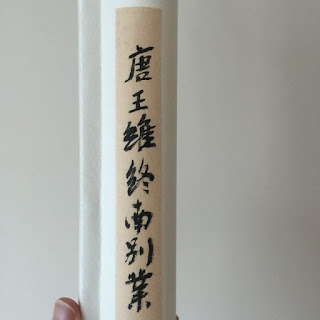My favorite Wang Wei poem is 'My Cottage at Deep South Mountain'
In my middle years I love the Tao
and by Deep South Mountain I make my home.
When happy I go alone into the mountains.
Only I understand this joy.
I walk until the water ends, and sit
waiting for the hour when clouds rise.
If I happen to meet an old woodcutter,
I chat with him, laughing and lost to time.
It makes me think of my father who likes to retreat to his cottage in the Southern Mountains of New Zealand and enjoy the peace and nature.
Here is a rough guide to the Chinese characters and their meanings
終南別業
[final][southern][villa]
中歲頗好道,
[middle][years][very][love][the way]
晚家南山垂。
[late][home][south][mountain][along]
興來每獨往,
[desiring this] [each][solitary][life]
勝事空自知。
[lifes affairs][empty][onesself][knowledge]
行到水窮處,
[go][until][waters][edge]
坐看雲起時。
[sit][watch][clouds][rise][time]
偶然值林叟,
[accidental][naturally][happen to][forest][man]
談笑無還期。
[talk][laugh][not][return][period-of-time]
終南山= literally 'Final Southern Mountains' are the Zhongnan mountains near Xi’an, Shaanxi . They "have been a popular dwelling-place for Daoist hermits and Buddhist monks since ancient times" (wiki link and china tours link).
So we can also have this more literal translation:
(source Follow the Blue Flute)
The poem is both evocative and speaks directly to zen buddhist ideals. For example see this analysis by Ancient Forest Zen (link) from the perspective of Soto Zen, the Zen sect that Rika's family belongs to. Its worth reading in its entirety so I'll just pick out a couple of comments.
"by Deep South Mountain I make my home". The poet is saying that he is a follower of the Southern school of Zen Buddhism which Soto Zen stems from.
"If I happen to meet an old woodcutter, I chat with him, laughing and forget about time". Wang Wei ends the poem by saying that he realizes that he is fine exactly where he is. He sees that there is no other place where he has to be.
Finally the Chinese with Mandarin pronunciation.
終南別業 《Zhōng Nán Bié Yè》
中歲頗好道, (Zhōng suì pō hǎo dào)
晚家南山垂。 (Wǎn jiā nán shān chuí)
興來每獨往, (Xìng lái měi dú wǎng)
勝事空自知。 (Shèng shì kōng zì zhī)
行到水窮處, (Xíng dào shuǐ qióng chù)
坐看雲起時。 (Zuò kàn yún qǐ shí)
偶然值林叟, (Ǒu rán zhí lín sǒu)
談笑無還期。 (Tán xiào wú huán qí)
Note that
Zh is 'j' like in judge
Xi is 'sh' like she
Z is 'ds 'like kids









No comments:
Post a Comment